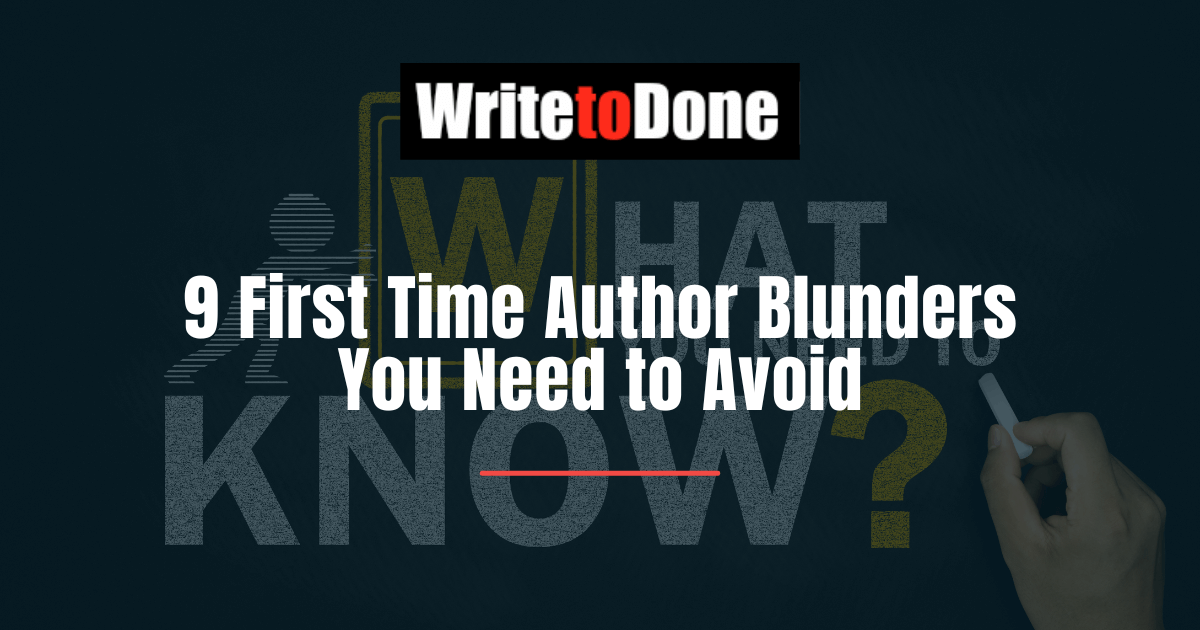Books can make, break, or elevate a brand.
And author blunders destroy a book.
A book is the ultimate business card and a creative way to expand your voice. Most of all, publishing a book is a powerful way to share your story and expertise in a way that can change someone’s life.
As someone involved in the book industry for twenty years, I’ve seen plenty of successes and flops. And the ever-changing publishing landscape has created unprecedented opportunities for new authors to stand out.
1.Do it for the money.
Yes, a successful book should be cashflow positive. But there are other ways to measure ROI. Some clients measure their book’s effectiveness by the doors that open or the clients they land. It’s quite possible to sell ten books, and earn $100k in new business as a result. Not a bad return, right?
Additionally, if money is the main motivation, the quality of the book will suffer. When writing your book, keep your reader in mind, and hold nothing back to help them.
2.Fall in love with the title.
No matter how much you love the working title of your book, if there are twelve other identical titles available on Amazon — or one by Malcolm Gladwell — it’s time for another brainstorming session.
Do the painful work of brainstorming a title and subtitle early in the process. This will help you center the writing around a theme or word-picture. That said, be open about changing the title and subtitle as the book evolves.
3.Design the cover.
This is one of the most common author blunders I see.
Your book is a product, not just personal expression.
Unless your business creates bestselling book covers, hire a professional, and utilize focus-group testing. Cover design is an art form unto itself, so don’t be a control freak.
If every focus group prefers a design that’s not your favorite, consider a new favorite, or keep trying. Bottom line — don’t settle until your cover is amazing.
4.Don’t plan the book like a business.
The most helpful nonfiction books are equal parts visceral expression and strategic planning.
Purposely decide how you want the book to position you and build your brand. I always begin a project by interviewing the author and drawing out what the marketing pitch will be for the book. People buy books to find answers and solve problems.
What questions is your ideal reader asking? What problems do they face?
Before you write, plan the progression you want the reader to experience and how you will address their questions and struggles. Develop a clear value proposition for your book, and make sure each chapter delivers on that promise.
5.Don’t let your humanity show.
I have two goals for chapter one of any nonfiction book I help develop : the reader must like the author, and the reader must trust the author.
The old adage applies here, “People don’t care how much you know until they know how much you care.” Since your primary motivation is to help the reader, make that clear in the first chapter.
In addition to showing glimpses of your accomplishments, to build credibility, you must not take yourself too seriously. Admit a huge blunder or a weakness the reader can relate to. In other words, be human.
6.Don’t obtain endorsements.
It’s so much easier than you think to connect with the influencers you admire and receive a valuable endorsement blurb for your book. For first-time authors, endorsements are key to building credibility.
An endorsement is a win-win proposition if your book is solid. The endorsers get their name and credentials out to a new audience, and your brand is elevated in the process.
Think about it. When perusing a new book, don’t you look at the endorsements and foreword when making a buying decision? So why not have persuasive endorsements on your book?
The most strategic endorsements are from either well-known authors or those with well-known brands in their title. For example, people might not know Jill-Bob Smith, but they will recognize the brand they represent.
7.Don’t test the content.
Book ideas are great fun.
We carry them around inside us with a warm fuzzy feeling. We imagine strolling into the bank with enormous royalty checks. But it’s scary to test a book idea in a blog, social media post, or shop an article to an industry publication.
What if people hate your premise? Or worse — what if no one cares?But this is where books go from good to great. Use feedback to thicken your writer-skin and deliver a better product. Use social media to test your insights and craft more memorable statements. As with the development of any product, build a prototype, test it, and improve.
8.Don’t tell stories.
No matter how riveting your worldview and ideas are, stories are the life blood of a good book.
Human beings are wired to perk up when hearing or reading a story. And, believe it or not, your readers want to hear your stories.
I recommend at least one story in every chapter. These can be from your life, business, or stories from history. And remember, if stories involve colleagues, get written permission to use their names, and/or modify the details and names to protect the innocent.
9.Don’t start.
Your book might just launch your career to places you never imagined. But if you don’t start, you’ll never finish. And you’ll never know how many people your book could have helped.
Editor’s Note: Don’t hit “Publish” yet!
Your book is more than a book—it’s an ambassador for your brand and your career. If you find this post helpful, you’ll be interested in Mike’s branding course for authors. Click here for details and 50% off exclusively for WritetoDone readers.
















